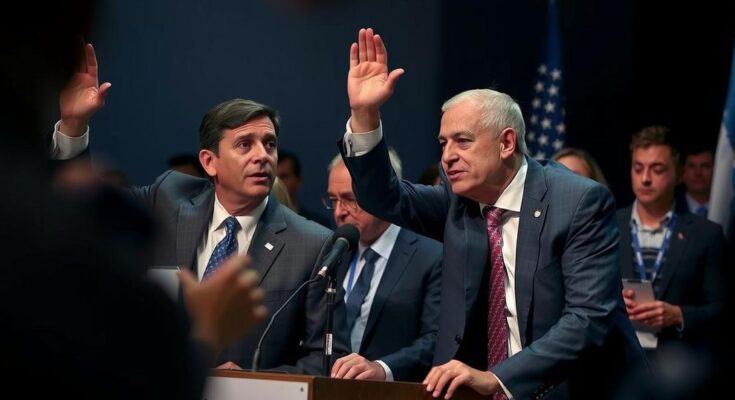Uruguay’s presidential runoff pits Alvaro Delgado against Yamandu Orsi in a highly competitive race following a first round where Orsi led with 44% and Delgado gained 27%. The election reflects voter indecision amid rising crime and economic concerns, with both candidates proposing differing approaches toward continuity or reform. As the citizens prepare to vote, this election is poised to reshape the country’s political landscape.
Uruguay is headed for a decisive presidential runoff this Sunday as the race between incumbent Alvaro Delgado of the National Party and Yamandu Orsi from the Broad Front tightens. In the initial election, Orsi garnered 44% of the votes against Delgado’s 27%, with additional support for conservative parties giving Delgado an edge. Despite facing voter apathy and uncertainly tied polls—with a notable portion of undecided voters—the candidates are fighting to address rising crime rates and propose competing economic policies. Orsi, an advocate for a new left movement, draws influence from the successful governance of former President Jose Mujica. Delgado, growing from a pro-business environment established by President Luis Lacalle Pou, campaigns on maintaining continuity in economic policy choices, amid an economy poised for growth amid several corruption scandals from the past. As Uruguay’s citizens prepare to vote, they face a crucial moment that may redefine their political landscape and domestic priorities.
The current electoral situation in Uruguay emerges from a divided political landscape primarily between the conservative National Party and the left-leaning Broad Front coalition, which dominated the presidency from 2004 to 2019. Recent elections indicated a shift toward competitive politics with a growing emphasis on issues like crime and economic reform. With the former administration’s policies still resonating with voters amid rising crime rates, both candidates must navigate a complex terrain of public sentiment, past political legacies, and economic expectations while appealing to a populace that displayed significant indecision in the previous election.
The upcoming presidential runoff in Uruguay signifies a crucial decision point for voters between two distinct visions for the nation’s future. With both candidates addressing pressing social issues and economic growth strategies, the election embodies the broader challenges of governance and public sentiment in contemporary Uruguay. The results may not only determine the presidency but could also signal a shift in political discourse and public policy priorities for years to come.
Original Source: apnews.com




